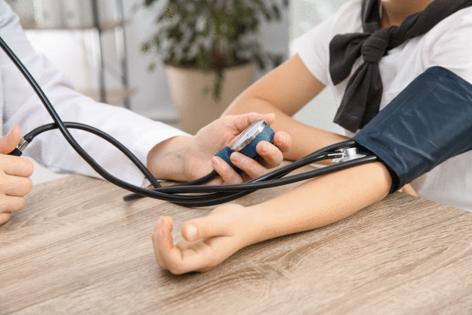Blood pressure-lowering medication shows promise in new trial results
Published in News & Features
People with high blood pressure that is uncontrolled or poorly treated with most medications may benefit from a new drug that is showing promise in clinical trial results, according to a study published Wednesday in the New England Journal of Medicine.
The study found that lorundostat, the drug made by Pennsylvania-based Mineralys Therapeutics, averaged a 15-point average decrease in participants’ systolic blood pressure, a finding that was a little more than double the reduction observed in patients who received placebo treatment. Conducted in 285 patients nationwide, including some living in San Diego County, the study’s findings are similar to those observed in a phase three trial of lorundostat conducted in 1,083 patients, for which preliminary results were released in March.
Systolic blood pressure is the higher of the two figures that patients are commonly quoted during regular medical checkups. It represents the force exerted on blood vessels when the heart beats.
Dr. Michael Wilkinson, the local principal investigator for the San Diego arm of the phase two study and a cardiologist at UC San Diego Health, said that the drug, which blocks the action of the hormone aldosterone, is particularly promising because of its ability to lower systolic blood pressure while also causing minimal complications. Aldosterone is known to cause water and sodium retention in the kidneys, increasing total blood volume and thus pressure which can damage blood vessels and other critical tissue in the body.
“The key to understanding the significance of the reduction in systolic blood pressure is that these are patients we see in our clinic who have uncontrolled hypertension, despite the use of two to five anti-hypertensive medications,” Wilkinson said. “These patients need new and additional options to treat their high blood pressure.”
Hypertension is a major risk factor for cardiovascular disease and is said to affect more than 120 million Americans.
Being able to reduce pressure by 15 points, he said, could be clinically significant, especially for those on the more extreme side of the scale.
“We would expect that being able to help these patients achieve safer blood pressure levels will make a significant difference in helping them to avoid heart attacks and strokes,” Wilkinson said.
UC San Diego, and several other smaller local clinical trial centers, are among 104 nationwide that participated in the phase two trials that enrolled patients with blood pressure measurements of at least 149/90 mm Hg. The randomized and placebo-controlled trial is open only to those taking, but not significantly benefiting from, between two and five anti-hypertension medications.
Participants were required to stop their existing medication regimens and adopt a standardized course of treatment before taking the drug, which was assessed either at a 50 milligram daily dose or in an escalating dose to 100 milligrams over the study’s 12-week course.
_____
©2025 The San Diego Union-Tribune. Visit sandiegouniontribune.com. Distributed by Tribune Content Agency, LLC.







Comments